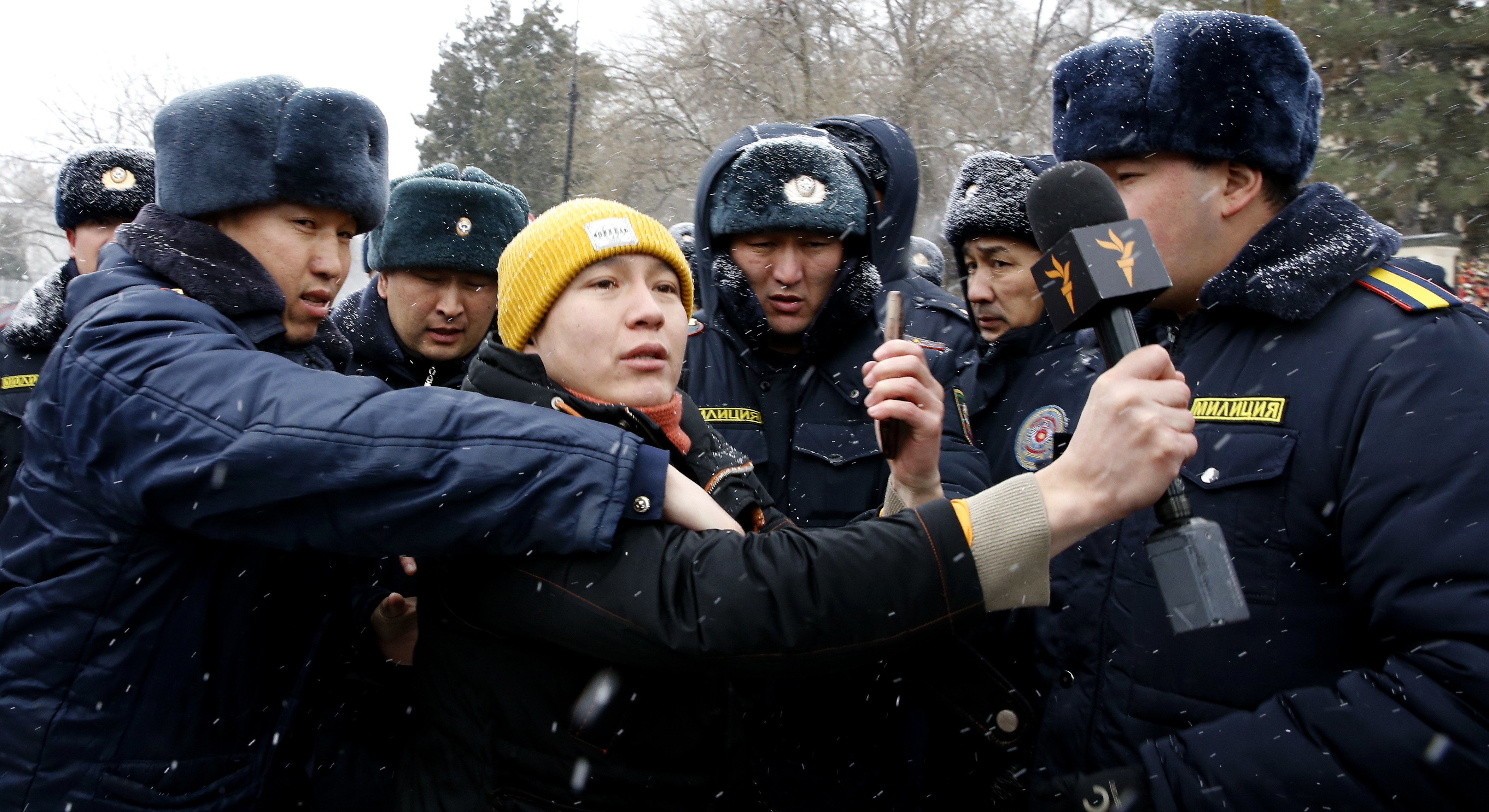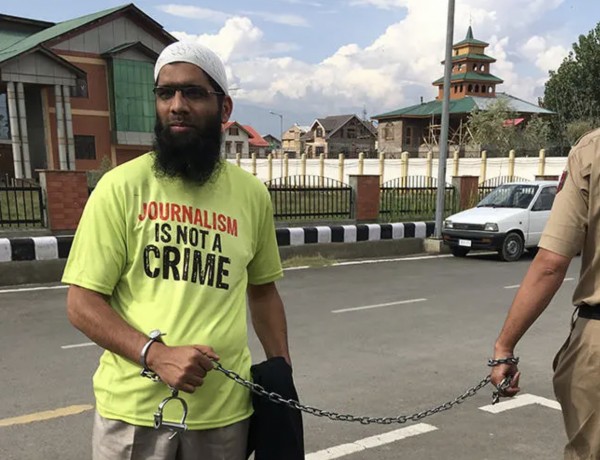Russia’s notorious “foreign agents” law is inspiring similar measures in the region. While citizens in Georgia successfully opposed a bill on “foreign agents” in March, Kyrgyzstan is considering a similar proposal, which experts say is modeled on Russian legislation that has been used to suppress independent media and civil society. In parallel, Kyrgyzstan’s parliament is debating a new media law which, if passed, could herald the end of independent journalism in the country.
Different name, same intent
In late May, a group of 33 Kyrgyz MPs proposed a bill amending a Kyrgyz law regulating non-profit organizations. If approved, the amendments would introduce the term “foreign representative”, which would be applied to non-profits (including non-profit media organizations) receiving funds from foreign governments, or from international organizations (such as donor organizations) that carry out “political activities” in Kyrgyzstan. According to the bill, a copy of which was reviewed by the International Press Institute (IPI), these organizations would be obliged to register as foreign representatives and submit regular reports to the authorities on the organization’s employment structure, as well as financial reports and audits.
Authorities will be able to suspend the activities of “foreign” non-profits which do not register. Organizations which take part in “violence against citizens or otherwise damage their health” could be fined, and their employees imprisoned for up to ten years.
The bill is “a 95% copy of Russian laws” on foreign agents, Kyrgyz media lawyer Semetey Amanbekov told IPI. The similarities are not accidental, he said, with Russia attempting to bring Kyrgyzstan and other countries into its “orbit” through laws banning foreign representation, he said.
A “foreign representative” is in practice a “foreign agent”, agreed Akmat Alagushev, a media lawyer at the Kyrgyz Institute for Media Policy. “The name was changed”, he said, but the spectrum of what is included – such as extra audits and other procedures, the financial burden, bans, and the possibility of closure – “this is all the same as in Russia”.
While some members of Kyrgyzstan’s parliament had attempted to introduce legislation repressing independent media and non-profit organizations in the past, “geopolitical changes” following Russia’s full-scale aggression of Ukraine now make approval of the law more likely.
According to Kyrgyz media lawyers contacted by IPI, parliament would normally not be able to pass the law before MPs go on holiday in July, but a speedy adoption of the law, in violation of the parliament’s organizational rules, cannot be excluded.
“Pressure [on MPs] is serious, and I am sure many of them receive instructions on having this law passed”, Amanbekov said. “We can seriously feel the pressure on this from the Kremlin.”
Rise in rhetoric
Anna Kapushenko, editor-in-chief at Kloop, a major independent news site which would be concerned by the law on “foreign representatives” (and one of this year’s nominees for the IPI-IMS Free Media Pioneer award), said that officials in the country, including President Japarov, increasingly use the type of anti-media rhetoric spearheaded by Russian officials. “Many articles [in pro-government sources] are currently published claiming that independent media receive grants from America, from the West. [They said that these media] allegedly interfere in the country’s internal affairs and are trying to destroy the country. They also use the homophobia narrative, saying that all these outlets, and specifically Kloop, are promoting an LGBT agenda, and that for these reasons they should be closed.”
Media lawyers expressed concern that the situation could get worse. “I am sure that if Kyrgyzstan accepts the term ‘foreign representative’, then a number of amendments will later be accepted to harshen concepts such as ‘undesirable organization’, ‘foreign influence’ and others”, Amanbekov said, alluding to the progression of Russia’s “foreign agent” law.
A turning point in Kyrgyz history
The adoption of the bill on “foreign representatives” would be a turning point for Kyrgyzstan, which had previously been considered an island of democracy in Central Asia. At the same time, the administration of President Japarov has also proposed a new media law, which worries the country’s media sector just as much.
Tabled last October, the bill is still being debated in regular meetings between MPs and presidential representatives on one side, and representatives of the media sector on the other. The latter are concerned by several aspects of the law, which is meant to update legislation in place since 1992. Among other things, the law would oblige online media to register with authorities. Additionally, the rights of freelance journalists would be seriously curtailed, while outlets considered to have “abused the freedom of the press” could be closed by authorities.
Harsher than Russian legislation, which allows but does not require sites to register, the Kyrgyz proposal, according to Amanbekov, aims to give the authorities “excuses not to register sites, to remove uncomfortable media, investigations, and to ‘clean’ the country’s informational sphere” according to the wishes of the government.
As an example, Amanbekov noted that websites will have to provide their geography of distribution and their circulation. “It’s hard to even understand what this means, as a website can be accessed from anywhere in the world. What does circulation even mean for websites? And this is only one of many possible excuses not to register a news site”, he said.
Lack of real dialogue with authorities attempting to control media
Alagushev echoed concerns about the website registration requirement, saying that it would be “harmful”, “technically complicated” and open to manipulation by courts dependent on the government’s political will. As a result, many media will not receive their registration, he believes.
Additionally, under the new law, only registered outlets will be accredited to work in parliament and state institutions. This will “kill the institution of freelance journalism”, Amanbekov said. “The informational sphere of Kyrgyzstan will simply cease to exist.”
While, in theory, Kyrgyz authorities are still open to dialogue with civil society, media lawyers contacted by IPI confirm that expert concerns are not listened to, with legislators refusing to answer questions, for instance on the usefulness of website registration.
“The initiators of the law speak a lot about the ‘responsibility’ of online media, and of wanting to ‘suppress wicked’ influence”, explained Alagushev. “But media are already liable under the current media law, including online media. So, this argument is invalid. This is just legislation intending to punish [independent media]. In a public debate, the initiators of the law simply have no arguments. For this reason, they refused such a debate.”
A tendency confirmed by Kapushenko: “We can see that this is a strategy, a plan to weaken independent media, to have no alternative viewpoints, and for the only possible opinion to be that the government of Kyrgyzstan is doing an amazing job.”
Media accused of “abusing freedom of the press”
The new media law would also outlaw “abuse” of press freedom, and media with two repeated violations of this provision face closure. But “no one knows what abuse of press freedom is, because no laws define this”, Amanbekov says. “Authorities will be able to determine this themselves. For instance, even negative news, criticizing MPs, the president, could be interpreted as such.”
He added: “The new media law and the bill on ‘foreign representatives’ are exclusively attempts to silence independent media and to fully subordinate the informational sphere of Kyrgyzstan to authorities.”
With trust in government still low in Kyrgyzstan, journalists are often the only option citizens have to solve their problems: “Because authorities step in only after journalists make noise,” Amanbekov explains.
The concrete results of authorities’ drive to shut down independent media in Kyrgyzstan can already be seen. One of the most visible examples of this are attempts to close Radio Azattyk, the Kyrgyz-language service of Radio Free Europe/Radio Liberty. Currently, the media company is appealing a ruling by a district court in Bishkek, which ordered it to halt operations in Kyrgyzstan following a lawsuit by the Ministry of Culture. According to Kapushenko, this case shows that the Kyrgyz government sees free speech as an “obstacle in its path”.
Azattyk was targeted through a recently adopted law aiming to combat “false information”, Alagushev explained. “This law was adopted with all possible mistakes, despite [media lawyers’] warnings. It was simply adopted due to pressure by the executive branch of government. As a result, we can observe a serious fallback tendency in terms of freedom of speech. And all of this [is happening] despite the Constitution clearly saying none of this is legal.”
A political scene increasingly controlled by President Japarov
“I think all efforts will be put into the law [on foreign representatives] passing before the parliament goes on vacation on July 1”, Amanbekov added. Otherwise, they will try to pass it in the fall. We are asking MPs not to vote for this law and for the president to veto it.”
“In Kyrgyzstan, things have become very complicated, especially following the adoption of the new constitution [in 2021] and the election of the new president [Sadyr Japarov]”, Alagushev concludes. “Now Kyrgyzstan is governed by the president, whereas before it was a parliamentary republic. MPs are now responsible before the president. The role of parliamentarianism has dropped almost to zero. The bill on ‘foreign representatives’ is sponsored by 33 MPs out of 90…this already says something. Things like this did not happen before.”
Over the past months, IPI and partner organizations have repeatedly reached out to Kyrgyz officials, namely the Presidential Administration, Parliament, Government of Kyrgyzstan, as well as the Ministries of Culture and Foreign Affairs, attempting to establish a dialogue on worrying tendencies moving Kyrgyzstan away from internationally recognized basic principles, such as freedom of the press, and bringing the country closer to authoritarian government models promoted by Russia. To date, none of our letters or other communications have been answered.



